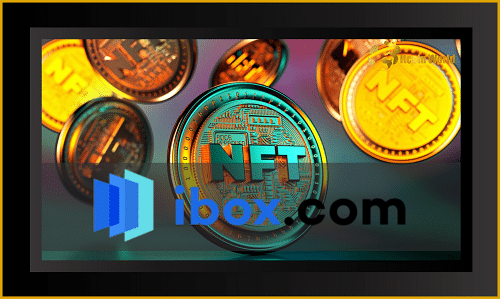In a surprising turn of events for the digital collectibles world, Chinese NFT marketplace iBox has announced the closure of its international operations. Effective September, the platform will begin processing refunds, leaving many in the crypto and NFT space wondering – what’s next for digital assets in China?
iBox Closes International Doors: What We Know
The announcement, sudden as it was, came without a detailed explanation from iBox itself. However, whispers online suggest the platform’s international arm might have run afoul of regulations by offering NFTs priced in USDT, a stablecoin. Let’s break down the key developments:
- iBox International Shutdown: The platform is ceasing its international operations and will initiate refunds starting in September.
- No Official Reason: iBox hasn’t explicitly stated the reason for the closure, leaving room for speculation.
- USDT Pricing Rumors: Unconfirmed reports point to the international platform potentially offering NFTs priced in USDT, which could be a regulatory concern.
This news arrives amidst a complex backdrop of China’s evolving stance on cryptocurrencies and digital assets. To understand the context, let’s rewind a bit.
China’s Crypto Crackdown: A Quick Recap
Remember September 2021? That’s when China delivered a significant blow to the crypto world by declaring all cryptocurrency transactions illegal. This wasn’t just a slap on the wrist; it triggered a mass exodus. Crypto exchanges, miners, and various industry players scrambled to relocate their operations outside of mainland China.
This regulatory hammer came down hard, impacting the global crypto landscape significantly. Major exchanges had to rethink their strategies, and the ripple effects were felt across the entire digital asset ecosystem.
Huobi’s Connection and Distancing Act
Now, let’s bring Huobi into the picture. Huobi, a major cryptocurrency exchange, had launched an incubator program back in May 2021. Guess who was part of this program? Yes, iBox. Huobi’s incubator aimed to provide resources and guidance to promising startups, and iBox seemed to fit the bill at the time.
Huobi’s incubator program was initially seen as a positive step for nurturing innovation in the crypto space. However, with China’s regulatory changes, things became complicated.
Following iBox’s closure announcement, Huobi was quick to distance itself. In a statement released on Thursday, Huobi clarified that they had exited mainland China in May 2021 and ended their partnership with iBox in January 2022.
Huobi emphasized their commitment to regulatory compliance, stating that Huobi Global no longer conducts business in mainland China and urged users to adhere to local regulations and be vigilant against scams.
iBox in Mainland China: Business as Usual?
Interestingly, while iBox’s international platform is shutting down, its operations within mainland China are reportedly continuing as usual. Here’s the crucial difference: iBox’s mainland China operations deal with “digital collectibles” and use fiat currency (like Yuan) instead of cryptocurrencies.
According to local media reports, iBox in China has seen impressive daily sales, peaking at over 100 million yuan (approximately $14.59 million USD). This highlights a significant distinction in how digital assets are treated within and outside of China’s regulatory perimeter.
NFTs vs. ‘Digital Collectibles’ in China: A Fine Line
This brings us to a critical point: the legal status of NFTs in China. While cryptocurrencies are outright banned, NFTs exist in a gray area. In China, they are often referred to as “digital collectibles.” Crucially, they are not outright illegal, but they operate under a different set of rules and expectations.
Chinese state media frequently issues warnings against the speculative nature of reselling these “digital collectibles” for profit. The government seems to be walking a tightrope – acknowledging the technological potential of NFTs while trying to prevent the kind of crypto speculation they’ve clamped down on.
NFTs and China’s Economic Ambitions: A Conflicting Narrative?
Adding another layer of complexity, major economic centers like Shanghai and Beijing are actively exploring the integration of NFTs into their regional economic development plans. This suggests a nuanced approach within China. While there’s strict control over cryptocurrencies and related activities, there’s also recognition of the potential of blockchain technology and digital assets like NFTs, particularly for specific applications beyond financial speculation.
Key Takeaways: China and NFTs
- Regulatory Ambiguity: NFTs, or “digital collectibles,” exist in a legally ambiguous space in China, unlike banned cryptocurrencies.
- Fiat-Based Operations: Successful NFT platforms in mainland China, like iBox’s domestic arm, operate using fiat currency, avoiding crypto transactions.
- Regional Adoption: Major Chinese cities are exploring NFT applications for economic development, indicating a selective embrace of the technology.
- Speculation Concerns: The Chinese government is wary of NFT speculation and actively discourages reselling for profit.
What Does iBox’s Exit Mean for the NFT Market?
The closure of iBox’s international platform raises several questions:
- Increased Regulatory Pressure? Does this signal a broader tightening of regulations on international NFT platforms operating even tangentially with China?
- Impact on Global NFT Market? Will this event deter other platforms from targeting the Chinese market or users interested in Chinese digital collectibles?
- Future of ‘Digital Collectibles’ in China? How will the “digital collectibles” market evolve within China’s unique regulatory framework?
The iBox situation serves as a stark reminder of the complex and ever-changing regulatory landscape surrounding crypto and NFTs, especially in China. For those in the crypto exchange, crypto market, and NFT space, staying informed and adaptable is more crucial than ever. The story of iBox is still unfolding, and its impact on the global digital asset landscape remains to be seen.
Disclaimer: The information provided is not trading advice, Bitcoinworld.co.in holds no liability for any investments made based on the information provided on this page. We strongly recommend independent research and/or consultation with a qualified professional before making any investment decisions.


